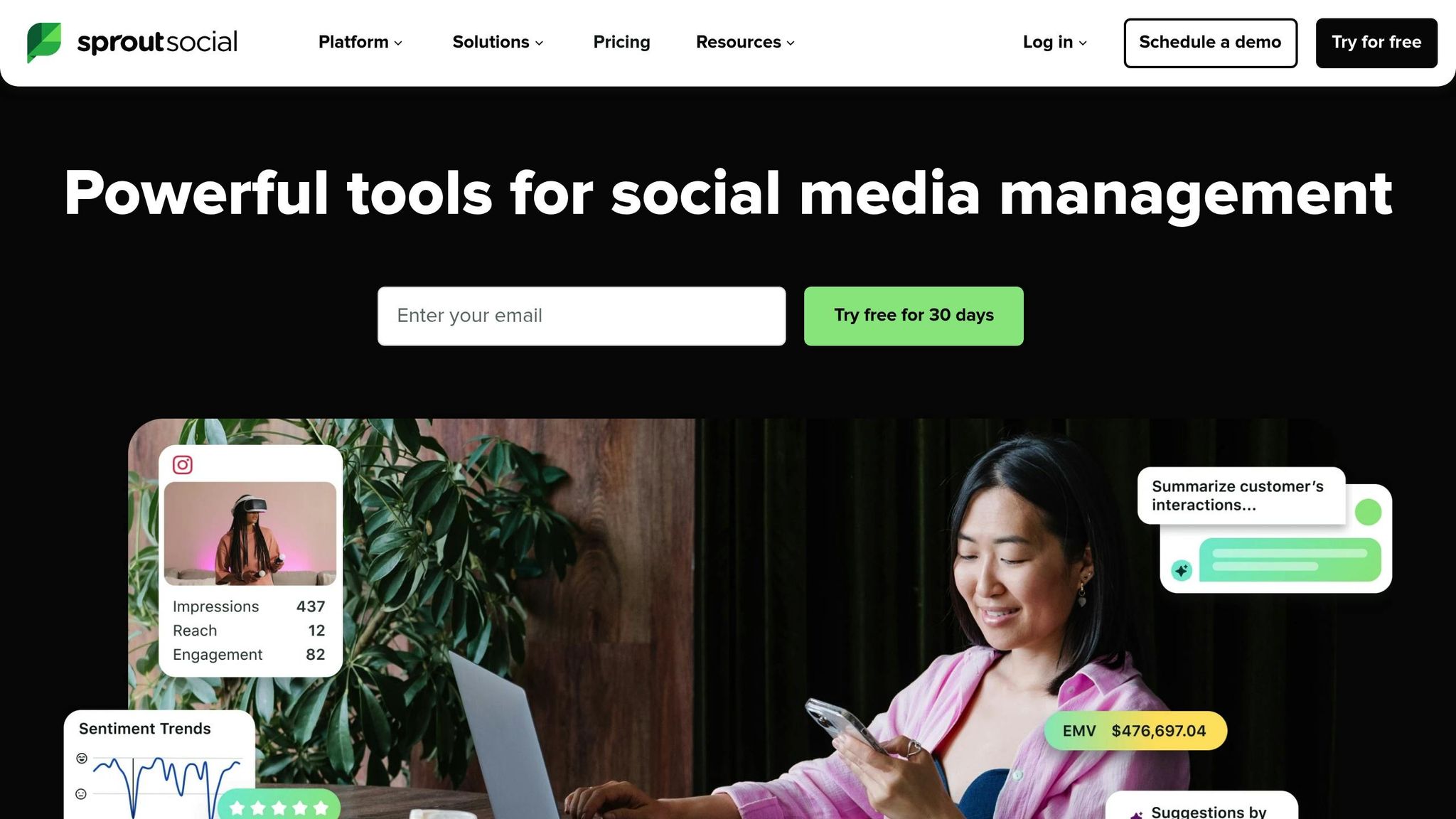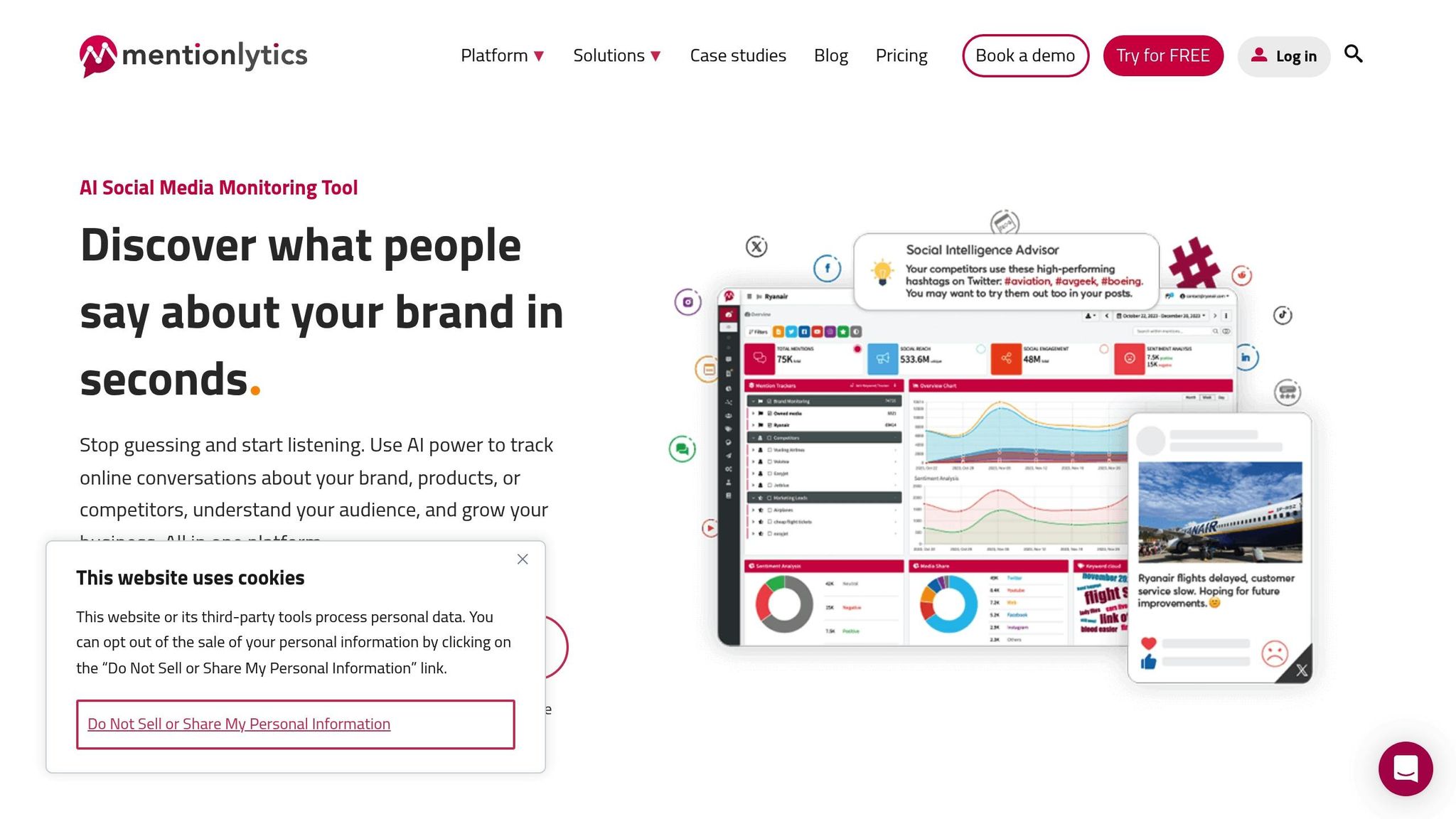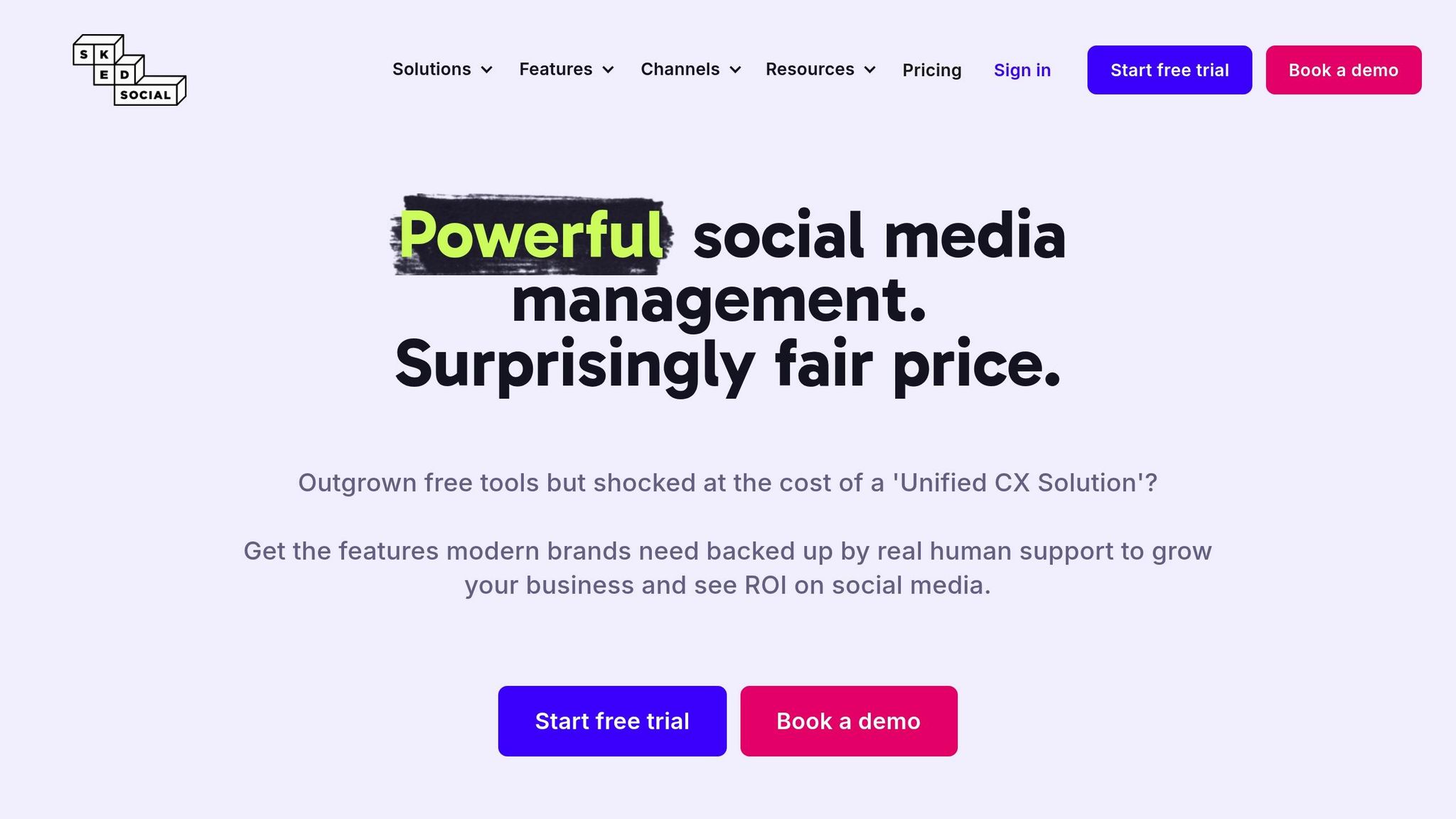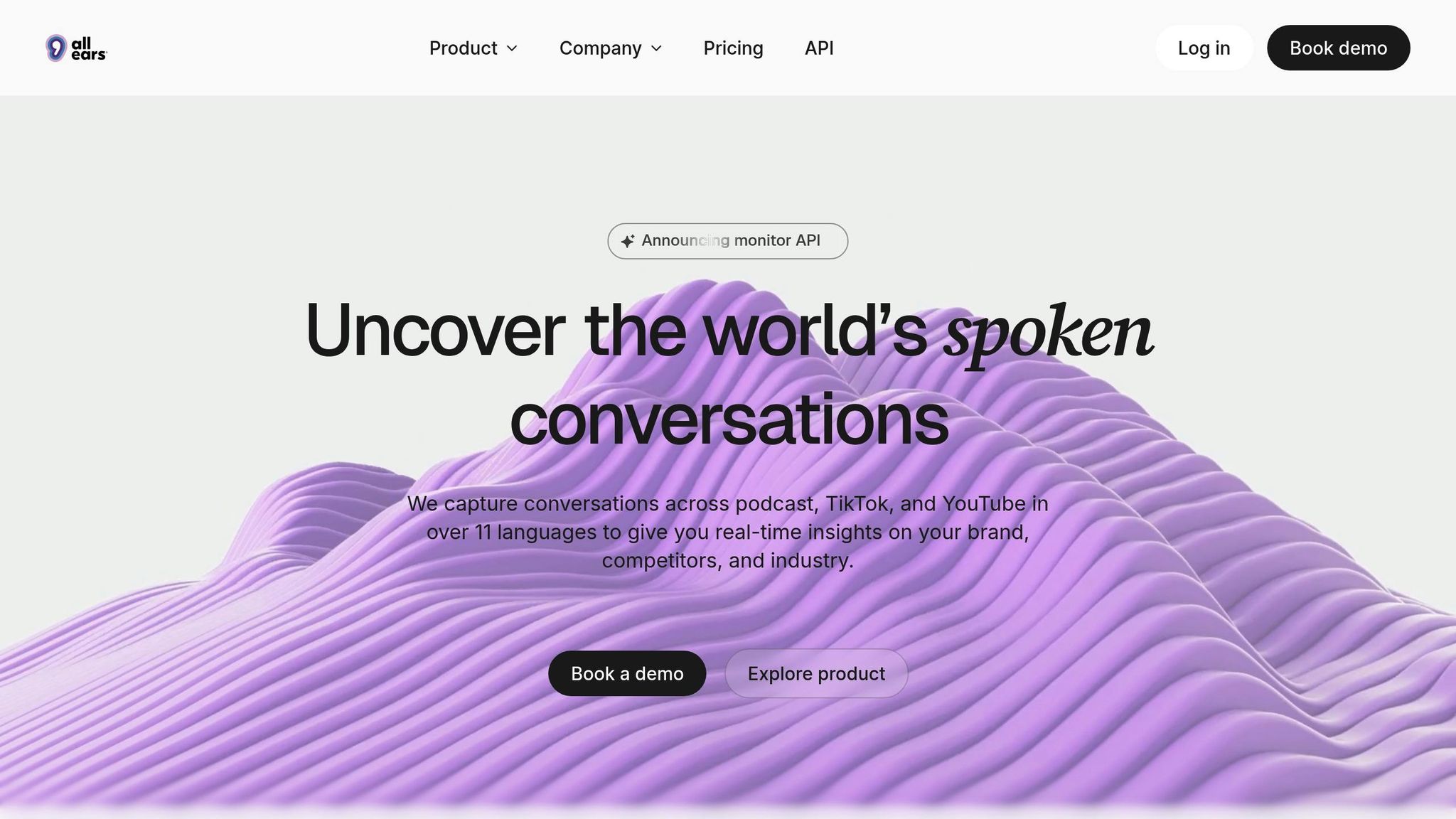
Social Listening Tools for SMBs: AI Options Compared
Compare AI social listening tools by features, pricing, and platform coverage to find the best fit for your small business budget and goals.

Written by
Adam Stewart
Key Points
- Tools start at $19/month - find budget-friendly options with essential features
- Check platform coverage - many tools miss TikTok, LinkedIn, or Instagram
- Look for CRM integration to automate responses and streamline your workflow
- Get real-time sentiment analysis to catch problems before they go viral
Looking for the best AI social listening tools for your small or medium-sized business (SMB)? Here’s the deal: these tools help you monitor online conversations about your brand, track trends, and respond to customer feedback quickly. But not all tools are created equal - some focus on affordability, while others offer advanced analytics or easy integration with your existing systems.
Key Takeaways:
- Social listening tools use AI to analyze customer sentiment, track mentions, and provide actionable insights.
- SMBs often face challenges like tight budgets, limited time, and the need for simple tools.
- Popular tools include Sprout Social, Talkwalker, Mentionlytics, Sked Social, and All Ears, each with unique features, pricing, and focus areas.
Quick Overview:
- Sprout Social: Best for integrated social management; starts at $249/month.
- Talkwalker: Great for global monitoring and trend analysis; custom pricing, typically $9,600/year.
- Mentionlytics: Affordable real-time monitoring; starts at $39/month.
- Sked Social: Combines publishing and listening; starts at $25/month.
- All Ears: Focuses on audio/video content; starts at $49/month.
What to Consider:
- Budget: Prices range from $19/month to $9,600/year.
- Ease of Use: Tools like Mentionlytics and Sked Social are beginner-friendly.
- Features: Decide between basic monitoring or advanced analytics.
- Integration: Check if the tool syncs with your CRM or marketing platforms.
AI social listening tools are transforming how SMBs manage their online presence, improve customer service, and create smarter marketing strategies. Ready to dive into the details? Let’s break it down.
Key Features of AI Social Listening Tools
AI social listening tools can turn online chatter into actionable insights. The right mix of features can completely change the way businesses understand and respond to customer conversations.
Real-Time Monitoring and Sentiment Analysis
Real-time monitoring is at the heart of effective social listening. AI-powered tools use machine learning to analyze tone and intent as it happens [1][2]. This means you can get instant alerts when there’s a spike in mentions or when your brand is discussed in critical contexts. These capabilities allow businesses to respond swiftly to customer feedback or potential issues.
Sentiment analysis, driven by AI, goes beyond simple emotion detection. It picks up on context, sarcasm, and subtle nuances. For example, Sprinklr uses AI to track sentiment and intent across more than 25 social networks in real-time, while Talkwalker's Blue Silk AI analyzes trends across over 150 million sources [1][2].
For small and medium-sized businesses (SMBs), this technology can analyze thousands of conversations instantly, enabling quick action when problems arise. These tools set a strong foundation for tracking activity across multiple platforms.
Multi-Platform Coverage and Keyword Tracking
Platform coverage varies widely between tools. Sprinklr monitors 30+ social channels and millions of online sources, while Talkwalker scans over 150 million sources, including social media, blogs, forums, and news sites. On the other hand, Brand24 tracks 25 million sources and offers features like "Discussion Leaders" to identify influential voices on specific topics [1][2][5].
Some platforms, however, provide limited coverage on networks like TikTok, LinkedIn, Facebook, or Instagram [2]. For SMBs targeting global audiences, tools like Mention offer multi-language monitoring, making them a strong choice [2].
Keyword tracking also differs in complexity and usability. Tools like Hootsuite allow brands to set up custom alerts for mentions and keywords across platforms, with built-in collaboration tools [1]. Awario provides ongoing keyword monitoring, turning social listening into a proactive sales strategy [3]. For SMBs, simpler tools like Brand24 and Mention offer user-friendly interfaces for keyword tracking, while more advanced platforms provide greater flexibility but come with a steeper learning curve.
Integration and Reporting Features
Once real-time insights and multi-platform data are gathered, integration and reporting features help businesses take action and plan strategically. Many tools offer seamless integration with CRM and marketing platforms, automating reporting and enabling immediate responses [1][2].
For SMBs, tools like Mention provide API integrations that allow social listening data to be pulled into custom dashboards or linked with email alert systems [2]. This means a detected customer complaint can automatically trigger a ticket in your CRM or notify the right team member.
Dashboards and automated reporting simplify raw data into clear, actionable insights. The most effective dashboards focus on key metrics tied to business goals, presenting information in formats that are easy for non-technical team members to understand and act on.
Top AI Social Listening Tools for SMBs Compared
Picking the right AI social listening tool is crucial for shaping an effective social media strategy, especially for small and medium-sized businesses (SMBs) that need to balance affordability with functionality. Each platform has its own strengths, pricing models, and features tailored to SMB needs. Below, we break down some of the top tools, highlighting what they offer and how they stack up for SMBs.
Sprout Social

Sprout Social combines social media management with listening tools, making it a great choice for SMBs. Its AI Assist feature helps summarize conversations and identify key trends, all accessible through a unified inbox that promotes team collaboration. This makes it easier to gauge customer sentiment without wading through endless data. Additionally, its automated reporting generates weekly summaries with minimal effort, saving time for busy teams.
- Pricing: Starts at $249 per month, placing it on the higher end for SMBs. However, its robust features can potentially replace the need for multiple tools.
- Pros: Intuitive interface, excellent customer support, seamless integration of publishing and listening, and strong collaboration tools.
- Cons: Higher cost compared to niche listening tools and less advanced analytics than enterprise-grade platforms.
Talkwalker

Talkwalker offers powerful AI-driven analytics, scanning over 150 million sources, including social media, blogs, forums, and news outlets. It shines in multilingual monitoring and trend analysis, with advanced image and video recognition to track visual mentions and logos - perfect for brands that rely on visual content.
- Pricing: Custom plans, typically starting at $9,600 annually for SMBs. While pricey, the depth of analytics and access to historical data can be worth it for data-focused teams.
- Pros: Extensive global coverage, strong trend analysis, multilingual monitoring, advanced visual content tracking, and robust historical data.
- Cons: High cost for smaller businesses, complicated to set up, steep learning curve, and limited coverage of newer platforms like TikTok.
Mentionlytics

Mentionlytics simplifies social listening with automated analysis and alerts, categorizing mentions by sentiment and urgency. This allows businesses to quickly address customer feedback or emerging issues. It also offers customizable keyword tracking with real-time notifications, and its user-friendly dashboard makes it accessible for non-technical users.
- Pricing: Starts at $19 per month, making it one of the most budget-friendly options for SMBs.
- Pros: Affordable, easy to set up, effective real-time alerts, and responsive customer support.
- Cons: Less advanced analytics compared to premium tools, narrower data coverage, and fewer integration options.
Sked Social

Sked Social blends social media publishing with listening capabilities, allowing teams to maintain consistent messaging while monitoring audience reactions. Its AI-powered tools, including sentiment analysis, keyword tracking, and automated reporting, are particularly helpful for small teams juggling multiple responsibilities. The platform also excels in visual content management, making it ideal for Instagram and Facebook campaigns.
- Pricing: Starts at $29 per month, offering strong value for its integrated publishing and listening features.
- Pros: Combines publishing and listening, affordable dual functionality, excellent visual content tools, and an easy-to-use interface.
- Cons: Less advanced listening features compared to specialized tools, limited analytics, and narrower platform coverage.
All Ears

All Ears focuses on voice and video analysis, providing SMBs with tools to monitor audio and visual content alongside traditional text-based channels. It can transcribe and analyze spoken content, assess sentiment in podcasts or video reviews, and flag key multimedia mentions. This makes it particularly useful for industries like education, entertainment, and customer service, where audio and video play a major role in brand perception.
- Pricing: Varies based on usage and features, with flexible plans tailored to SMB needs.
- Pros: Unique focus on voice and video analysis, flexible pricing, and AI technology designed for multimedia content.
- Cons: Still relatively new with limited user reviews, less comprehensive for text-based monitoring, and a shorter track record compared to more established tools.
How AI Social Listening Improves SMB Operations
AI social listening tools are reshaping how small and medium-sized businesses (SMBs) operate. By weaving real-time social insights into everyday workflows, these tools help SMBs respond quickly, make smarter marketing decisions, and safeguard their reputation. These benefits build on the features highlighted earlier.
Better Customer Service and Engagement
Real-time monitoring is a game-changer for customer service. SMBs can spot issues and opportunities as they happen across social platforms. For instance, tools like Sprout Social provide unified inboxes that bring together customer interactions from multiple platforms into one dashboard. This makes it easier for small teams to manage inquiries efficiently.
AI-powered sentiment analysis takes it a step further by helping teams prioritize their responses. Imagine a customer venting frustration about a delayed order - AI flags the comment as urgent, allowing the service team to step in before the issue spirals. This proactive approach not only resolves problems faster but also enhances customer satisfaction. These features perfectly complement the real-time monitoring and multi-platform coverage discussed earlier.
Custom alerts for mentions of brand names, products, or competitors ensure SMBs never miss a critical conversation.
For businesses juggling both social media and phone inquiries, tools like Dialzara bridge the gap. Dialzara’s AI-powered virtual phone answering service handles call transfers, messages, and even appointment bookings, ensuring 24/7 availability while social listening tools monitor online interactions.
Improved Marketing Campaigns
Social listening tools provide a treasure trove of insights for marketing. By analyzing trending topics and online conversations, SMBs can fine-tune their messaging to better connect with their audience. For example, Talkwalker’s trend prediction and multilingual sentiment analysis help businesses identify which topics are gaining momentum.
Tracking competitor mentions also offers valuable market intelligence. If customers complain about a competitor’s pricing or service, an SMB can craft targeted campaigns that highlight its own strengths - moving beyond generic marketing messages.
Timing and content are critical for campaign success, and social listening data helps optimize both. Tools like Brand24, which track conversations across over 25 million online sources, can reveal peak engagement times and trending topics. This kind of insight enables SMBs to launch campaigns when they’ll have the most impact.
When social listening tools integrate with CRM and marketing platforms, the benefits multiply. Feeding social insights directly into customer records and automation systems allows teams to create campaigns that feel personal and are rooted in real customer sentiment and behavior. This seamless integration mirrors the comprehensive monitoring features discussed earlier.
Crisis Management and Reputation Protection
AI social listening tools also play a vital role in crisis management. Spotting trouble early can prevent small issues from turning into full-blown crises. These tools monitor for spikes in negative sentiment, unusual mention volumes, or emerging complaints - giving SMBs a chance to act before things escalate.
Take the example of a small retail brand using Sprout Social. They detected a surge in negative comments about a product defect through real-time monitoring. By responding quickly and transparently on social media, the brand was able to address the issue, limit reputational damage, and rebuild customer trust. Features like a unified inbox and sentiment analysis helped the team prioritize and tackle the most pressing feedback effectively.
Visual listening tools add another layer of protection by identifying negative imagery, ensuring nothing slips through the cracks.
Automated alerts make crisis management even more efficient. By setting up notifications for negative sentiment thresholds, competitor activity, and industry-specific keywords, SMBs can ensure the right team members are looped in. This allows for a coordinated and timely response across all relevant channels.
sbb-itb-ef0082b
AI Social Listening Tools Comparison Table
To make selecting an AI social listening tool easier for SMBs, here's a side-by-side comparison that highlights the key factors: features, coverage, pricing, ease of use, and integrations. This breakdown simplifies the decision-making process by focusing on what matters most for small and medium-sized businesses.
Comparison Criteria
This table evaluates tools based on critical aspects that directly affect SMBs' daily operations and budgets. Core AI features include tools like sentiment analysis, automated alerts, and reporting that help turn data into actionable steps. Platform coverage examines how many sources each tool monitors - ranging from social media platforms to blogs and news websites. Pricing reflects the monthly cost and available tiers, while ease of use considers how simple it is to set up and learn. Lastly, integration capabilities show how well each tool works with CRMs, marketing software, or other business systems to improve workflows.
| Tool | Core AI Features | Platform Coverage | Starting Price | Ease of Use | Key Integrations | Best For |
|---|---|---|---|---|---|---|
| Sprout Social | Sentiment analysis, AI summary, unified inbox | Multi-platform social networks | $249/month | High – intuitive interface | CRM, email marketing, analytics | SMBs needing integrated social management |
| Talkwalker | Trend prediction, multilingual sentiment analysis, visual listening | 30+ social networks, millions of sources | Custom pricing | Medium – steeper learning curve | Marketing automation, CRM, analytics | Global brand monitoring and crisis management |
| Mentionlytics | Real-time sentiment analysis, automated alerts, competitor tracking | Social media, web, news sites | $39/month | High – straightforward setup | Email, Slack, webhooks | Affordable real-time monitoring |
| Sked Social | Basic sentiment tracking, engagement analytics, scheduling integration | Major social platforms | $25/month | High – user-friendly | Social platforms, team collaboration | SMBs focused on scheduling and engagement |
| All Ears | Conversation analysis, actionable insights, simple reporting | Social conversations, review sites | $49/month | High – minimal setup required | Basic CRM, email notifications | Simple, actionable social insights |
This table highlights the variations in pricing, features, and integrations across the tools. For instance, Mentionlytics and Sked Social provide budget-friendly options for smaller teams, while Sprout Social offers a more feature-packed solution for businesses with advanced needs. Integration capabilities also differ - Sprout Social and Talkwalker excel in robust integrations, whereas All Ears focuses on essential CRM and notification connectivity. The right choice depends on your business's specific needs, budget, and existing tech stack.
Choosing the Right AI Social Listening Tool for Your SMB
Selecting the best AI social listening tool for your small or medium-sized business (SMB) means finding one that aligns with your specific goals, budget, and operational needs. Whether your focus is on improving customer service, managing your reputation, or staying ahead of trends, choosing the right tool requires careful consideration.
Key Factors for SMBs to Consider
When it comes to SMBs, affordability is often a top concern. But remember, the cheapest option isn’t always the best. A tool that integrates seamlessly with your existing systems can save time and simplify workflows, offering value beyond its price tag.
Ease of use is another critical factor. Tools like Sprout Social and All Ears are known for their user-friendly dashboards, making them easier for teams to adopt. On the other hand, more complex platforms might offer advanced features but could slow down adoption if the interface is hard to navigate. Taking advantage of free trials can help you determine if a tool’s interface fits your team’s comfort level before you commit.
Integration capabilities are also key. If your business already relies on platforms like Salesforce or HubSpot, look for tools that sync easily with these systems. This ensures that insights gained from social listening translate into actionable steps across your business operations [1][8].
Your primary objectives should guide your choice of features. For example, if your focus is on customer service, prioritize tools with real-time alerts and unified inboxes - Sprout Social is a great example of a platform offering these features [2]. If competitive analysis or trend tracking is more important, look for tools that deliver detailed analytics and access to historical data [6][7].
Platform coverage is another factor to weigh. While most tools monitor major social networks, others extend their reach to blogs, news sites, and review platforms. Evaluate how much coverage you need and balance it against your budget. Broader coverage often comes at a higher cost, so choose wisely based on your priorities.
By aligning your tool choice with these factors, you can build a social listening strategy that grows alongside your business.
Future Trends in AI Social Listening
When choosing a tool, it’s worth considering how future developments in AI might shape its capabilities. Social listening is evolving rapidly, and the tools of tomorrow will likely offer features that go far beyond what’s available today.
One such advancement is predictive analytics, which helps businesses anticipate trends and shifts in customer sentiment before they happen. This can enable SMBs to address potential issues proactively or seize new opportunities as they arise [2][9].
Another growing feature is personalized customer engagement. AI-powered tools are moving beyond generic responses by analyzing conversation context and sentiment to suggest tailored replies. This allows SMBs to deliver more meaningful and impactful interactions, leveling the playing field with larger competitors [2][9].
Visual and multimedia monitoring is also gaining traction. With advancements in image and video recognition, tools can now identify your brand in photos and videos and track visual content trends. As platforms continue to shift toward visual media, this feature becomes increasingly important [4][2].
Additionally, there’s a trend toward integration with broader Customer Experience Management (CXM) platforms. Future tools will likely offer deeper connections with customer service, sales, and marketing automation systems, giving SMBs a unified view of customer interactions across all channels [2][9].
Finally, multilingual sentiment analysis is opening doors for global expansion. Advanced AI can now interpret emotions and cultural nuances across multiple languages, making it easier for SMBs to connect with international audiences [2][6].
These trends point to a future where AI social listening tools become more predictive, personalized, and interconnected. By selecting platforms that are already innovating in these areas, SMBs can ensure their investment remains relevant as technology continues to advance.
FAQs
How can AI social listening tools help small and medium-sized businesses succeed?
AI social listening tools give small and medium-sized businesses (SMBs) the power to keep tabs on online chatter about their brand, industry, or competitors - all in real-time. This means SMBs can quickly spot customer needs, stay ahead of trends, and address feedback promptly, all without needing a big team or hefty budget.
What makes these tools so useful for SMBs is their ability to provide clear insights into how customers feel about their brand. This enables businesses to fine-tune their services, sharpen marketing strategies, and build stronger connections with their audience. Plus, because these AI tools handle the heavy lifting of data collection and analysis, they save precious time and resources while delivering insights that can boost growth and customer happiness.
How can small businesses balance cost and advanced features when choosing a social listening tool?
When choosing a social listening tool, small businesses need to strike a balance between cost and features. Start by pinpointing what your business truly needs - whether it’s tracking brand mentions, analyzing customer sentiment, or keeping an eye on competitors. Focus on tools that offer the features most relevant to your goals, so you’re not paying extra for bells and whistles you don’t need.
Ease of use is another key factor. Look for a tool that’s straightforward to set up and works well with your current systems. This can save time and cut down on training expenses. Lastly, review the pricing plans to ensure they align with your budget while still delivering the essential features that can help your business grow.
How can AI sentiment analysis help small businesses improve customer service and engagement?
AI-powered sentiment analysis is changing the way small businesses connect with their customers. By examining customer feedback, social media activity, and reviews, AI can detect emotions, spot trends, and understand opinions. This gives businesses a clearer picture of how their customers feel and what they need.
Armed with this information, small businesses can tailor their communication, quickly address issues, and boost customer satisfaction. Taking this proactive approach not only builds stronger connections but also helps fine-tune products and services to better meet customer expectations.
Summarize with AI
Related Posts
Top 6 AI Sentiment Tools for Small Business Owners
Explore six AI sentiment tools designed for small businesses to analyze customer feedback, identify trends, and enhance satisfaction.
How Small Businesses Use AI for Social Media Sentiment
Explore how small businesses leverage AI sentiment analysis to enhance customer engagement, improve marketing strategies, and optimize operations.
AI Social Media Tools for SMBs: Comparison
Explore essential AI social media tools for SMBs, comparing features like content creation, scheduling, and analytics to boost engagement and efficiency.
7 Best AI Tools for Real-Time Media Crisis Alerts in 2025
Explore five AI tools that empower small and medium-sized businesses to effectively manage social media crises and protect their online reputation.
